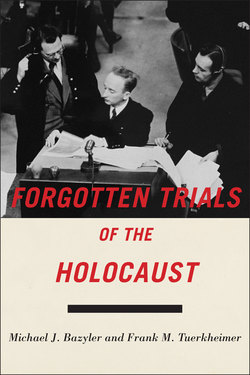Читать книгу Forgotten Trials of the Holocaust - Michael J. Bazyler - Страница 8
На сайте Литреса книга снята с продажи.
ОглавлениеACKNOWLEDGMENTS
The impetus for this book came from our many years of offering Holocaust-focused courses at our respective law schools and as visiting professors at other law schools around the world. It occurred to us that while several books have been written about individual trials concerning the mass murder of Jews during the Second World War, none has attempted to provide an overview of these prosecutions by actually focusing on the trials themselves. Further, it struck us that since most books on Holocaust trials have been written by academics, our backgrounds both as academicians and trial practitioners could provide a different perspective on these trials. Knowing that much has been written about the Nuremberg trial of major Nazi defendants and the Eichmann trial, we quickly decided that there was no need for yet another book on these trials. Rather, we aimed to focus on trials that remain largely unknown, not only to the general public, but even to many scholars. The ten trials we selected aim to reveal to the reader not just an intimate description of the Holocaust in operation, but an illustration of how different legal systems, over almost six decades, confronted the German plan to exterminate European Jewry.
We are indebted to many persons who have provided invaluable assistance to us as we have written this book. Both of us are indebted to Jennifer Hammer, our editor at New York University Press, and her assistant, Constance Grady. Their comments and advice, and their selection of extremely knowledgeable reviewers who have provided us with numerous helpful suggestions, vastly improved the end product which follows in these pages. Thanks also to Dan Geist and Professor Peter Hayes for their many helpful editorial suggestions.
With respect to the chapters written by Michael Bazyler, he is grateful to his faculty assistant Mary DeVlugt and law library assistant Deborah Lipton of the Dale E. Fowler School of Law at Chapman University. Professor Marilyn Harran at the Rodgers Center for Holocaust Education at Chapman University is a superb colleague, educator, and scholar, who took time out of her busy schedule to review the manuscript and provide very useful comments. A large number of Chapman law students provided invaluable research and cite-checking assistance. They include Tamara Rider, Malka Barhodari, Alison Bollbach, Nicole Hughes, Blair Russell, and Kellyanne Gold. William Elperin, president of The “1939” Society and his wife Rosemary also provided inspiration and guidance. Last, Michael is especially thankful to his independent editor, Bonny V. Fetterman.
With respect to the chapters written by Frank Tuerkheimer, he has been enormously assisted by Cheryl O’Connor of the University of Wisconsin Law Library and Michael Roffer of the New York Law School Library. Each has provided invaluable help in obtaining the background literature, not all of which is in English, but essential to the end product. Assistant Dean Kevin Kelly of the University of Wisconsin Law School was extraordinarily helpful in sharing his knowledge of U.S. military law. He is also indebted to Eileen Dorfman and Melissa Young, law students whose assistance has been essential in finalizing his chapters. Finally, his wife, Barbara Wolfson Tuerkheimer, has been a steady and constant source of encouragement over the years it has taken to bring this book to fruition. She has shared his sense that these trials should not be forgotten because the facts they reveal cannot be consigned to oblivion.
We dedicate this book to the many prosecutors who have labored tirelessly, sometimes with emotionally wrought and shaky witnesses, sometimes with ancient documents in a foreign language, sometimes with hostile tribunals, and always with engaged and effective opponents, in an effort to bring the perpetrators of mass murder to justice. Our admiration for them is unbounded. We single out two: Murray Bernays, who died in 1970, and Benjamin Ferencz, who at age ninety-four in 2014 is still pursuing the fight against genocide. Bernays was a lawyer with the United States Army who envisaged and helped implement a comprehensive postwar effort at Nuremberg to bring to justice those responsible for the carnage of the Second Word War in Europe. Ferencz was a young lawyer on the prosecution staff at Nuremberg who carried out the Bernays idea, prosecuted the Einsatzgruppen trial covered in Chapter 6, and who, in the almost seventy years since Nuremberg, has steadfastly continued his effort to expand and apply the principles of international criminal law developed at Nuremberg to the contemporary world.
